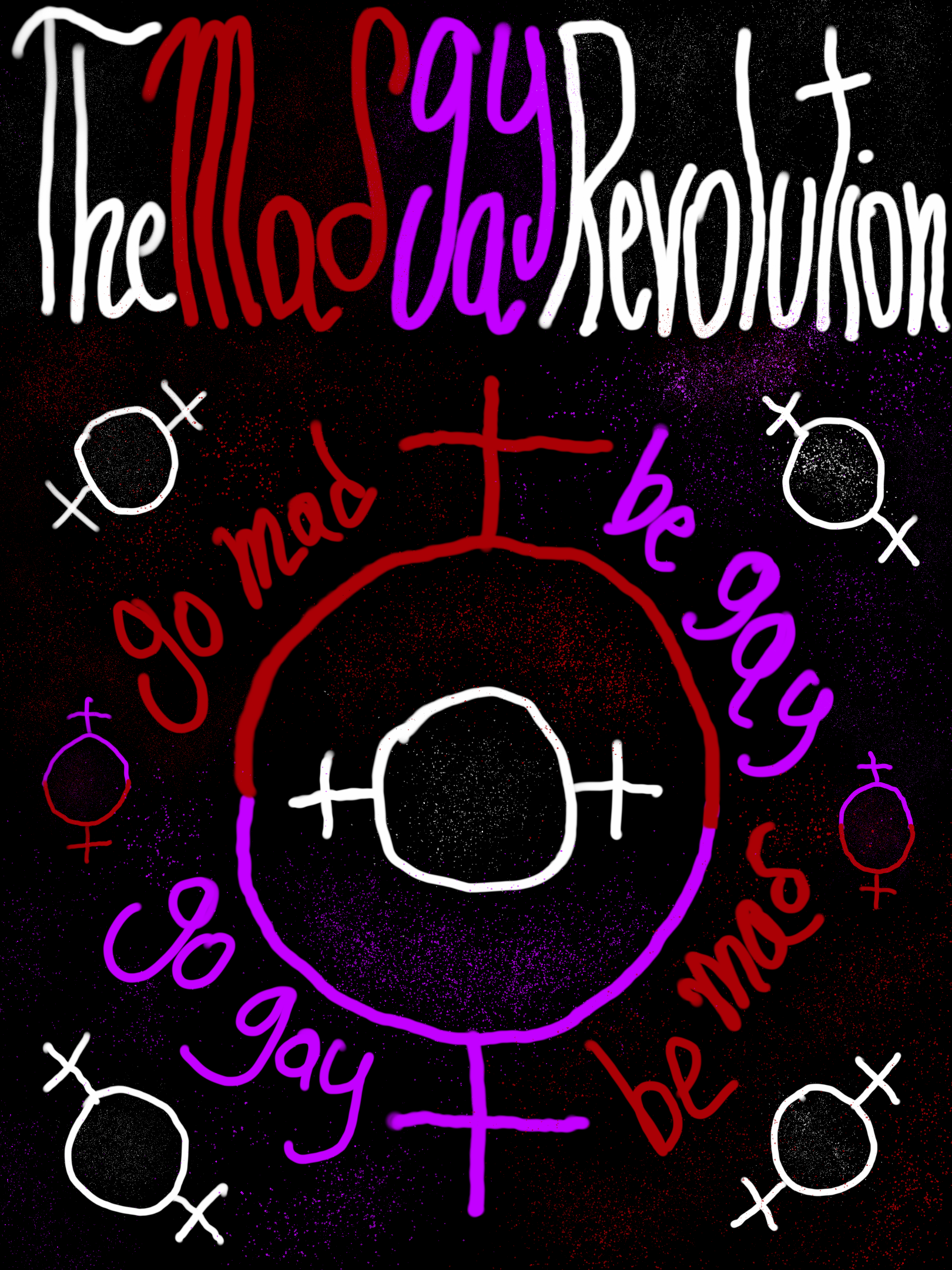-
Mad Movement Research
- Collecting resources and summarizing information adapted from multiple sources on Mad Pride and Mad Liberation.
Mad Pride Flag

Guiding Principles
Of The Mad Movement
Of The Mad Movement
Human Rights
Mad people deserve dignity, equality, and freedom from discrimination. The movement fights against coercion, forced treatment, and systemic oppression.
Self-Determination
Mad individuals have the right to define their own experiences and make decisions about their own lives.
Lived Experience As Expertise
The wisdom gained through lived experience is essential for shaping mental health policies and services.
Reclamation Of Madness
Madness is a cultural identity and a source of strength, creativity, and pride.
Community Solidarity
The movement is built on mutual support and inclusivity, valuing diverse voices and experiences.
Systemic Change
It critiques harmful psychiatric practices and advocates for person-centered, alternative approaches.
Hope and Transformation
At its heart, the movement envisions a future where Mad people thrive and are celebrated.
Challenging Stigma
The movement works to dismantle stereotypes and foster understanding through Mad voices and stories.
Intersectionality
It addresses how Madness intersects with other forms of oppression, like racism, sexism, and ableism.
Disability Justice
Challenges ableism, systemic oppression, and psychiatric control while advocating for autonomy, accessibility, and self-determination.
Frequently Asked Questions
What Is Mad Pride?
Mad Pride celebrates the human rights and spectacular culture of people considered very different by our society. It is a mass movement of the users of mental health services, former users, and the aligned, which advocates that individuals with "mental illness" should be proud of their Mad identity. Mad Pride challenges prevailing narratives that pathologize mental health experiences, seeking to redefine them as valid and valuable. It asserts the rights of individuals with lived experience to define their own experiences and narratives.
Mad Pride may be celebrated any time but is most often observed in the month of July, usually on or around July 14, Bastille Day. 2011 marked the 30th anniversary of psychiatric survivors using Bastille Day to celebrate Mad Pride.
The tradition of using Bastille Day as Mad Pride Day was started in New York by the Mental Patients Liberation Alliance and has since spread around the world. The 14th of July marks the anniversary of the storming of the Bastille in Paris, France in 1789. For over the past two centuries, the storming of the Bastille has been a universal symbol of liberation. In addition, when the Bastille was stormed, two prisoners with psychiatric labels being detained therefor that reason were freed.
The Mad Pride celebrations have grown directly out of an historic but little-known international social change movement led by psychiatric survivors that began in about 1970.
The month of July is shared with Disability Pride, so we celebrate both Disability and Madness in intercommunal solidarity.
Who Is Mad Pride For? Is It Only For Psychiatric Survivors?
This movement is open to all, whether or not you have personally been labeled by the psychiatric system. Mad Pride celebrates how each person's eccentricities, passion, uniqueness and freedom makes you truly human. Do not allow our very humanity to be pathologized by a corporate mental health system that has gone out of control! Celebrate your Mad Pride!
Is Using The Word "Mad" Stigmatizing?
The term "mad" has historically been used as a pejorative and derogatory term to stigmatise and marginalise individuals with mental health conditions or disabilities.
However, in recent years, there has been a growing movement to reclaim and redefine the word "mad" as a means of empowerment, advocacy, and challenging societal norms!
It is now framed as a social and political identity by people who have been labeled as mentally ill or as having mental health issues.
How Can I Support Mad Pride?
You can learn about the Mad movement, Mad liberation, Mad abolition, Mad culture, Mad competency, Mad love, Mad joy, and all things Mad. You can help to network, promote, and organize with the Mad community. And please talk about this, break the silence with your friends, relatives, colleagues. Ask them in July, "Did you know this is Mad Pride month"?
What Is Sanism?
Sanism refers to the systemic discrimination against or oppression of individuals perceived to have a mental disorder or cognitive impairment. This discrimination and oppression are based on numerous factors such as stereotypes about neurodiversity.
Discrimination in job duties, being treated less than, having low expectations are all institutional sanist practices. It also manifests as negative stereotypes, exclusion, and barriers in many aspects of social life.
Links
Mural
